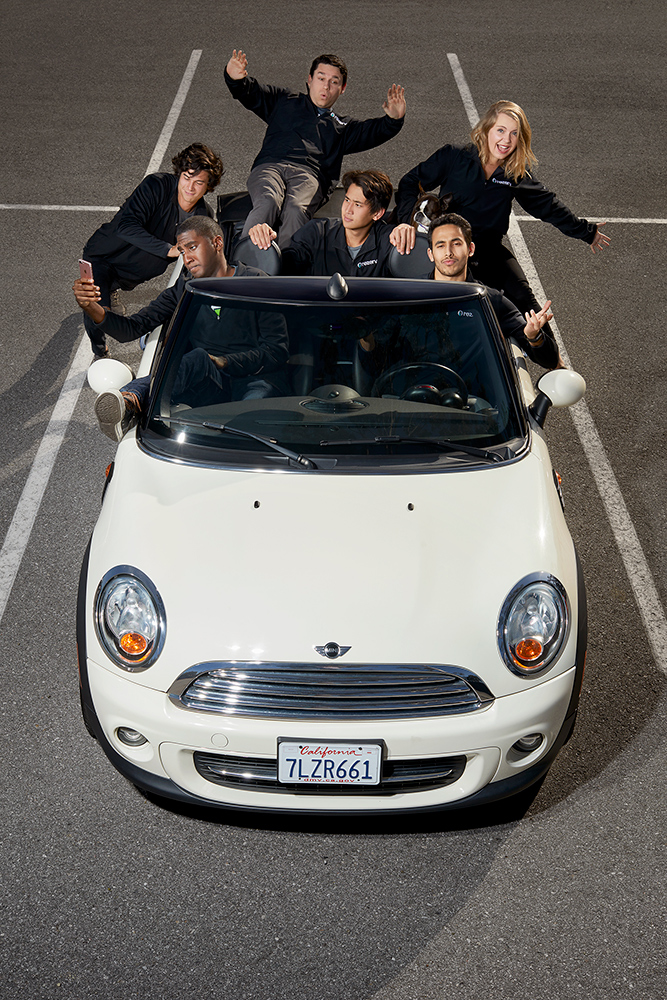
On most L.A. weekends, finding a parking place along Pacific Coast Highway, in the trendy Venice neighborhood of Abbot Kinney, or in walking distance of Santa Monica’s Third Street Promenade seems to take more luck than hitting it big in a Vegas casino. Now, a new app developed by students promises to guide drivers to open parking spots, replacing luck with tech.
Every driver knows these feelings: the frustration that builds as you make lap after lap around an area without finding parking, or the irritation of waiting behind a car that doesn’t actually pull out of the spot you think you got. The clock is ticking, the engine is running, your mood is souring. An elusive 8-by-20-foot piece of pavement is keeping you from someone or something.
It doesn’t have to be this way.
This spring, a group of enterprising LMU students launched Rezerv, a sharing economy app that tackles parking problems using an approach envisioned by Joseph (Leo) Screen ’19, an entrepreneurship major. Rezerv pairs drivers looking for parking with homeowners with open driveways or businesses with open lots. It navigates the driver to a location with available parking near his destination, offering that space for a certain time at a certain price, which is paid to the owner of the spot. Rezerv earns a small percentage from the transaction as well. Available in the App Store this past May, Rezerv is ready to serve selected areas along the congested Los Angeles coastline, with expansion to other cities later on.
The road to easier parking began in November 2016, when Screen and a team he assembled won Startup Weekend, an LMU event where students pitch their business ideas to a panel of successful entrepreneur judges. Out of about 50 proposals, the parking app was selected for additional development, earning advice from the experts and three months of workspace in nearby Playa Vista.
Since then, Rezerv has been through three pilot tests to prove the concept, arranging parking for hungry drivers headed to a food truck event in Venice, California, and helping fans find spots near the Coliseum for two USC football games.
“Trying something and failing, and then trying something different and succeeding really opened my eyes to how powerful creativity can be.”
The learning curve of this real-world endeavor has been steep, Screen says. “I thought the process would be faster, but as I worked at it, I realized there are many things to do to get into the App Store correctly,” he says. “I’ve gained hands-on experience by getting out there and trying things. I am applying everything I learn, and it’s been amazing.”
Other team members have had their own eye-opening lessons. A psychology and screenwriting major, Andrew Malekie ’19, Rezerv’s director of public relations, remembers pounding the pavement with Screen, the two walking through neighborhoods trying to introduce the idea to homeowners and businesses. All the “no”s did not crush them but pointed them toward a more formal approach, Malekie says. Customers bit the new bait. “Trying something and failing, and then trying something different and succeeding really opened my eyes to how powerful creativity can be.”
Rezerv co-founder Peyton Cross ’18, a computer science major, overcame challenges as well in his work on iOS development and the website. “We often underestimated the task and had to push our tests back a few days,” Cross says. “The project has taught me the importance of time management and estimation.”
Cross also experienced growth in his development skills. “I look at my old code and wonder, ‘Wow, what was I thinking?’ It wasn’t optimized or had some side effect.” His focus is now on fixing bugs and updating the code to interface better with the website. For example, he is improving the processes for reserving stalls, creating users, generating receipts, handling payments and more.
On the topic of money, building an app isn’t cheap. Screen has implemented a careful, phased approach to the financials. The first phase, which he called bootstrapping, included small amounts of money he and his family contributed; then he found an “uncle investor” who offered several thousand dollars to spur development. Now he’s seeking venture capital to help and has used his LMU connections to Silicon Beach leaders to meet with several prospective financial partners.
One steady partner offering guidance and support from the start has been David Choi, professor of entrepreneurship and director of the Fred Kiesner Center for Entrepreneurship in the College of Business Administration. Choi says: “There is a level of difficulty in getting any business started, but this one is even harder because you have to create a marketplace, with new customers and new providers, and the technology has to be working properly. Leo and his team are talented, optimistic and resilient. They are getting done what might be impossible for anyone else.”
One opportunity for the LMU team to expand Rezerv may actually be for LMU itself, for large public events on campus, such as Commencement. If that works out, the app will be an excellent reminder about the practical value of what LMU teaches.
Janis Rizzuto has been a freelance writer and copy editor for LMU Magazine for more than 10 years. She has a professional background in communications for the fields of education, financial services and health care. Rizzuto earned a bachelor’s degree in English from UC Irvine and a master’s degree in print journalism from USC.
This article appeared in the summer 2018 issue (Vol. 8, No. 2) of LMU Magazine.
